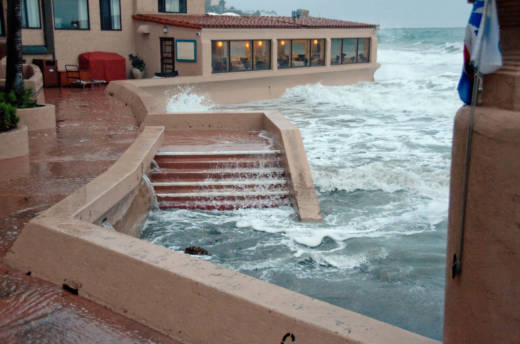The agency measured rates of high-tide flooding at 98 locations along the U.S. coastline. More than a quarter of the locations tied or broke their previous records, according to the report.
“As relative sea level increases, it no longer takes a strong storm or a hurricane to cause coastal high tide flooding,” the report said. “High tide flooding causes frequent road closures, overwhelmed storm drains, and compromised infrastructure.”
As noted in recent reports by KQED, global warming could cause San Francisco Bay to rise 5 feet by 2100:
Now the state of California is warning nine Bay Area counties that climate change means the bay is rising faster. Extreme tides, whipped by storms, have become both more frequent and more extreme. California’s latest and best word on sea levels, a report issued last spring, predicts that San Francisco Bay could rise from five to 15 times faster this century than the last one.
Despite all this, the NOAA report finds that some cities are ill-prepared for what’s to come. In Boston for instance, a recent city-backed study criticized a plan to protect the city from rising sea levels. From Inside Climate News:
Another proposal envisions a harbor-wide barrier system that would close during major storms and cost billions of dollars. But last week, a city-backed study recommended against building a barrier, saying the money would be better spent on smaller-scale measures, such as flood walls or green infrastructure.
And in New York City, a major coastal barrier that was planned for lower Manhattan has run into significant obstacles. Also from Inside Climate News:
New York, which also tied its record of 15 days of tidal flooding, has launched various initiatives…But a signature coastal project that would erect berms and walls to protect lower Manhattan—known as “The Big U”—has faced delays and been scaled back due to its high costs.
“Across the whole of the U.S. coastline, we are in dire need of action,” Ben Horton, a Rutgers University researcher, told CBS news.
The Washington Post notes that nowhere in the NOAA report is the term “climate change” mentioned, something that has become a hallmark of the Trump administration:
Neither the announcement of the high-tide flooding record, the accompanying summary nor the technical report mention the words “climate change,” which scientists widely believe is the underlying cause of sea-level rise and the increasing tides.
But in a conference call this week, report co-author William Sweet of NOAA’s Center for Operational Oceanographic Products and Services, told reporters that a third of sea level rise is currently driven by thermal expansion of ocean water, and two-thirds is now caused by the melting of land-based ice around the world — both processes that are clearly symptoms of global warming.

